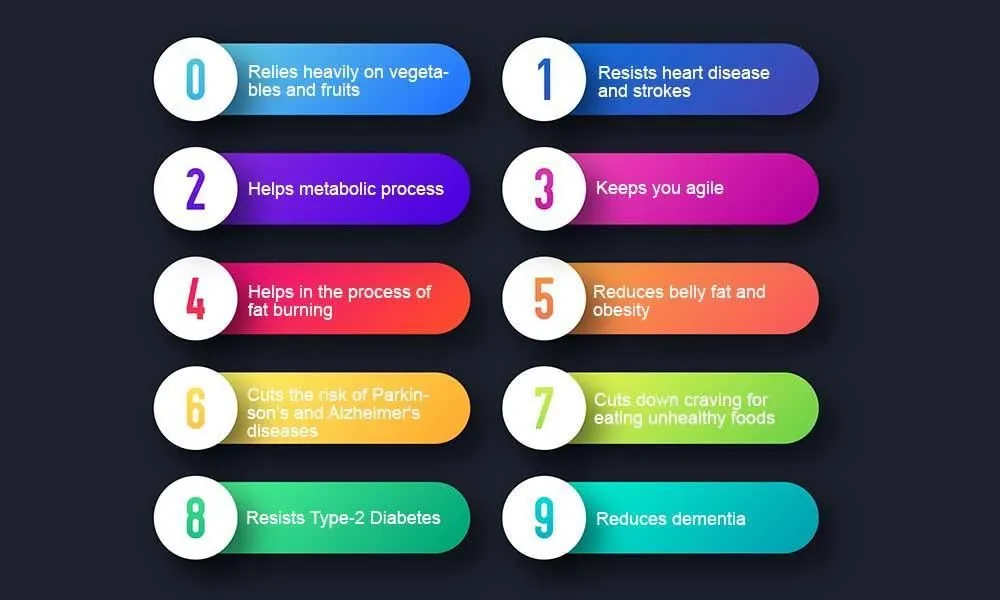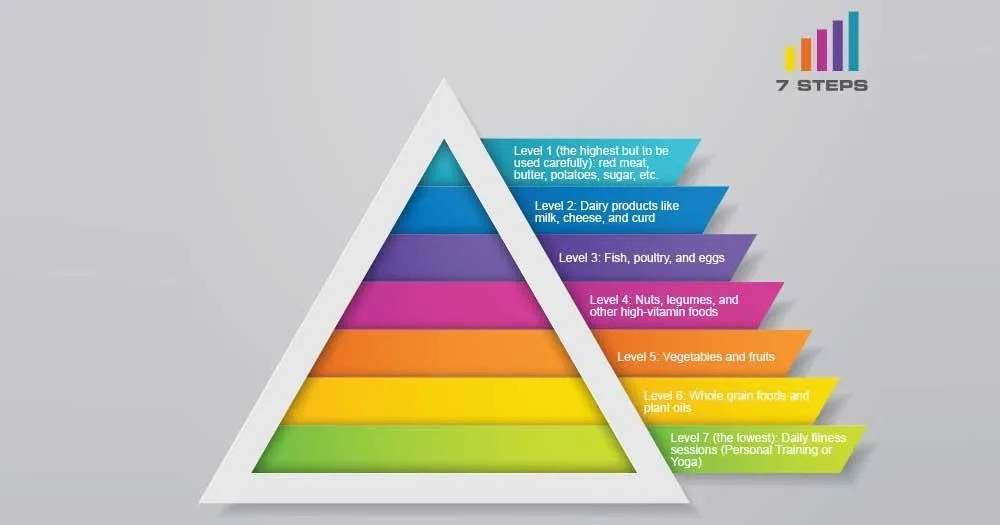A calorie-restricted diet is a personalized and energy-limited meal plan that is focused on reducing the intake of food. Especially crafted for obese or overweight people, this type of diet is also considered beneficial for pregnant women or people suffering from digestive system disorders.
It almost always results in a linear weight loss experience and may offer significant health benefits when done properly. We recommend backing it up with intermittent fasting at regular intervals so your body gets used to burning stored fats for its energy requirements instead of taking more food.
Here are some more reasons why you should switch to a calorie-limited diet:
This diet offers a realistic way to lose weight without being too hungry all the time. It does so by naturally reducing fat intake as it focuses on the intake of nutrient-rich food. However, it is important to boost one’s protein intake and reduce carbs consumption for the best results.
The inclusion of fish and dairy products provides the benefits of Omega-3s and probiotics. All the healthy fatty acids that are needed by the body to work and feel full, manage weight gain, control blood sugar, and improve your mood and energy levels are provided in the right quantities in this diet.
Primarily consisting of natural food items, such diet regimes are very low in sugar and artificial preservatives. One may also have fruits or small quantities of homemade desserts topped with honey. One may also go for fish instead of red meats and heavier meals to boost one’s omega-3 fatty acids.
This is of special significance for those obese people who are looking to lose weight faster and cut down their cholesterol levels.
Another important factor considered in this diet is a No Stress approach. This diet encourages people to spend time with family and bond over home-cooked healthy meals, get good sleep, and enjoy natural scenic beauty which helps in busting stress. You do know that chronic stress can kill the quality of your life along with your weight and health.
A further addition to this is the inclusion of love for and fascination with wine. (The red wine is considered beneficial and protective if taken in moderation). It may also relieve you of chronic complications and diseases related to stress like fatigue, inflammation, and weight gain.
It is rich in monounsaturated fats and omega-3 acids. Persisting with it may reduce heart diseases and gastrointestinal disorders. Most of the regional dishes there are cooked in olive oil, this may also decrease blood pressure and hypertension.
Low cholesterol levels are worse than high, and those eating healthy fats are immune to several health disorders. The key is to have a proper ratio between the consumption of Omega-3 and Omega-6 fatty acids in one’s bloodstream.
A diet that is rich in fresh plant foods and healthy fats is the shortcut to longevity. It is always advisable to add some monounsaturated fats to it to lower the risks of heart disease, depression, cognitive decline, and inflammatory diseases.
While minimal, a restrictive diet may offer some side effects like fluctuating body temperatures, weakness, sleepiness, menstrual irregularities, infertility, or hormonal changes. None of them are considered detrimental to one’s health if the restrictive diet is followed as advised and not extended beyond a certain period.
The Mediterranean diet uses the basic concepts of healthy eating like adding a splash of flavored olive oil and other components dictated by the traditional cooking style of the countries surrounding the Mediterranean Sea.
Research shows that eating the Mediterranean lowers LDL cholesterol (the bad one), which is the one that contributes to clogging your arteries with fatty deposits. This diet is also associated with reducing any incidences of cancer, Alzheimer’s, and Parkinson’s.
Mediterranean Diet is named thus because it was devised by the residents living near the Mediterranean Sea and that all the food sources required for it were sourced locally. The diet mostly comprises lean proteins and other less fatty foods that do not tax the metabolic system and thus help in weight management.
This diet comes from traditional foods eaten in countries like Greece and Italy back in the 1960s. Most of the fitness diets that you’d come across advocate eating vegetables, fruits, whole grains, fish, and healthy fats- and this one is not an exception either!
This diet uses subtle differences and variations that cut the risk for heart ailments and kidney disorders. Most people flock to it because they can get the best results without changing too much of their eating habits, including their love for consuming alcohol.
1. You should not consume fast foods or cola drinks
2. You may not consume sugars, pastries, cakes, candies, sweets, white bread
3. You should focus on fresh vegetables and fruits
4. You may eat eggs but not red meat
5. It is advisable to avoid canola oil and soybean oil
6. You may have yogurt and parmesan cheese
7. You may also have legumes and nuts
We shall talk about this feature list subsequently in this blog.
This restrictive diet is also associated with reducing the incidence of various types of deadly diseases. Many healthcare experts believe that women eating a diet supplemented with mixed nuts and extra virgin olive oil may have a reduced risk of breast cancer.
People of Mediterranean descent have a lower incidence of many deadly diseases and are very healthy. The traditional diet of the region helps them in weight management and may even prevent the occurrence of deadly diseases Type-2 diabetes, strokes, heart attacks, and even premature death.
Here are the health benefits of the Mediterranean diet:
Relies heavily on vegetables and fruits
Resists heart disease and strokes
Helps metabolic process
Keeps you agile
Helps in the process of fat burning
Reduces belly fat and obesity
Cuts the risk of Parkinson’s and Alzheimer's diseases
Cuts down craving for eating unhealthy foods
Resists Type-2 Diabetes
Reduces dementia
You don’t have to live in Greece or Italy to go on this restrictive diet. Here are some of the foods that you can go for to avail the benefits of this diet, but it would be best to consult an online wellness expert before opting for this specific diet list.
Tip: This professional can also help you with creating a personalized plan for weight loss and any other weight management goals too. It would be best to ask for a printable version of this calorie restriction diet plan from her so you could affix it to your refrigerator or wardrobe for a quick reference.
Healthy Fats: The foundation of this diet. Consists of using olives, olive oil, avocados, and avocado oil.
Seeds and Nuts: Walnuts, hazelnuts, almonds, Macadamia nuts, sunflower seeds, cashews, pumpkin seeds, etc.
Fruits: Bananas, apples, pears, oranges, grapes, strawberries, figs, peaches, melons, etc.
Vegetables: Cucumbers, broccoli, cauliflower, kale, spinach, tomatoes, onions, carrots, Brussels sprouts, etc.
Tubers: Sweet potatoes, yams, potatoes, turnips, etc.
Legumes: Peas, lentils, beans, chickpeas, beans, etc.
Whole Grains: Brown rice, whole oats, buckwheat, whole wheat, corn, barley, rye, whole grain pasta, and bread.
Seafood and Fish: Sardines, tuna, salmon, trout, mackerel, oysters, crab, clams, shrimp, mussels, etc.
Poultry: Duck, turkey, chicken, etc.
Egg: Duck, chicken, turkey, quail, and more.
Dairy: Yogurt, Greek yogurt, cheese, etc.
Spices and Herbs: sage, basil, rosemary, garlic, mint, nutmeg, cinnamon, pepper, etc.
Drink: Water, and lots of it. Coffee and tea, but stay away from sugar-laden beverages and fruit juices.
Persisting with a restrictive diet like this may also help you cut down about 300 calories from your daily diet and thus contribute to about 12% of your overall energy intake.
Also note: A related aspect is choosing the Keto diet. It offers nearly the same set of advantages but with a different set of dietary regimes and practices.
If pursuing this immensely popular restrictive diet is on your bucket list, we recommend starting with a well-planned diet list that caters to all your energy requirements. Such a priority-based food list for this is called the Mediterranean diet food list and it relies on a mix of healthy foods and drinks.
A sample diet food pyramid was co-developed by the World Health Organization (or WHO). It is as follows:
Level 1 (the highest but to be used carefully): red meat, butter, potatoes, sugar, etc.
Level 2: Dairy products like milk, cheese, and curd
Level 3: Fish, poultry, and eggs
Level 4: Nuts, legumes, and other high-vitamin foods
Level 5: Vegetables and fruits
Level 6: Whole grain foods and plant oils
Level 7 (the lowest): Daily fitness sessions (Personal Training or Yoga)
(Source: Wikipedia)
This food pyramid can be appended with moderate amounts of alcohol and multivitamins at different stages. The key is not to overindulge in consuming it.
The origin of this restrictive diet is in the historic eating and social patterns of the regions around southern Italy, Greece, Turkey, and Spain. The best thing about it is that it is indeed a tasty way to eat, drink, and live - and it is also a realistic and sustainable way to lose weight.
The way it works is like this:
Even though you are having your fill, you are not eating anything fatty or unhealthy or oily or anything likewise to hurt your health. You are also not eating anything tasteless, boring, insipid, oily, or fatty- you are just eating what you like most. Since taste is not being compromised, you can expect yourself to still have your favorite foods, provided you exercise strict control over the portion size.
Try canola or olive oil, and use it in cooking. Dip bread in flavored olive oil, or try tahini as a spread or dip.
Always have on hand for a quick snack. Choose natural peanut butter over the processed one. Try tahini made out of sesame seeds and use it as a spread or dip.
Try and eat fish one or two times a week. Eat fresh or water-packed fish. Grilled fish is good but avoid the fried fish at all costs.
Switch to lower fat dairy products, ice cream, and cheese. Drink skim milk instead of high-fat milk, low-fat cheese, and fat-free yogurt.
Substitute poultry and fish. It is that easy. Lean meat is okay if you must, but keep portions small. Stay away from high-fat meats such as bacon and sausage.
It is one of the healthiest diets known to man. People living in that geographical region have indulged in a high-fiber diet of fruits, vegetables, quality fats, and proteins. Even though this cuisine was from Italy, Greece, and Spain, it took over the world in the 1990s.
A study proved that it can improve heart health, help lose weight fast, and clear up other health issues. Persisting with its diet plan can thus help you have better fitness results over time.
Many nutrition experts have expressed their views that Mediterranean food is one of the most heart-healthy ways of eating. This diet is loaded with anti-inflammatory foods that mainly comprise plant-based foods and healthy fats.
1. To support this, the Harvard School of Public Health stated that, “Together with regular physical activity and not smoking, our analyses suggest that over 80% of coronary heart disease, 70% of stroke, and 90% of Type-2 diabetes can be avoided by healthy food choices that are consistent with the traditional Mediterranean diet.”
2. A Lyon Diet Heart Study showed that people who had heart attacks between 1988 and 1992 were either counseled to follow the standard post-heart attack diet advice or a typical Mediterranean diet. After 4 years, people who were following the Mediterranean diet experienced 70% fewer heart diseases.
A calorie-limited diet like the Mediterranean can help you cut down on the regular amount of excess calories that you are taking every day. It can also keep your metabolic processes and digestive system at ease, and you can translate this into a faster weight loss experience and lower blood sugar levels with improved fitness levels.
We recommend consulting a professional nutritionist to check for an alternative course of treatment like intermittent fasting to pump up your weight loss plans. Not only will it help you create a habit of consuming lesser calories daily, but it would also help you switch to a protein-based diet for building leaner muscles.



